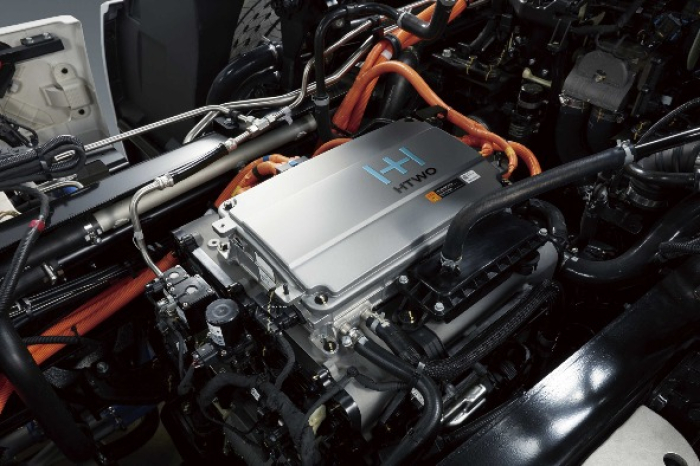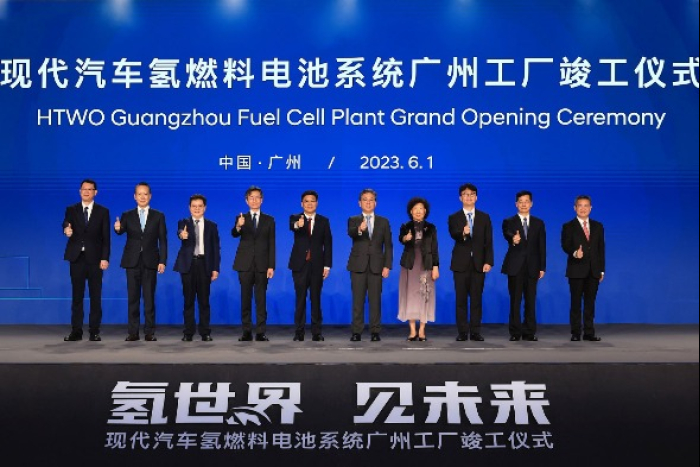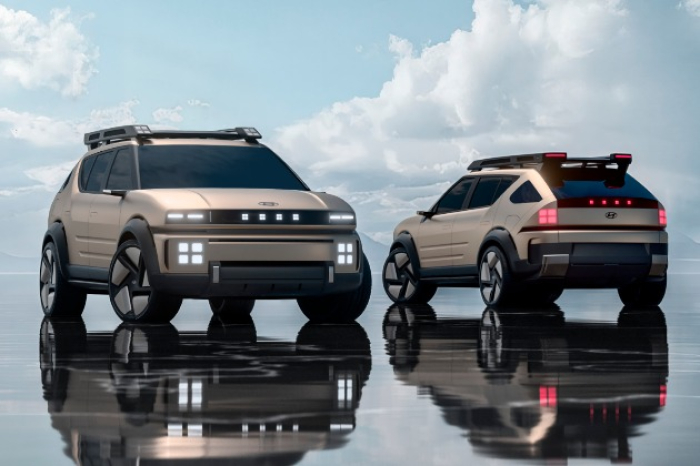Hydrogen economy
Hyundai Motor to build fuel cell plant in South Korea
The new plant is expected to be the South Korean auto giant’s second-largest fuel cell-manufacturing facility
By Mar 11, 2025 (Gmt+09:00)
2
Min read
Most Read
LG Chem to sell water filter business to Glenwood PE for $692 million


KT&G eyes overseas M&A after rejecting activist fund's offer


Kyobo Life poised to buy Japan’s SBI Group-owned savings bank


StockX in merger talks with Naver’s online reseller Kream


Meritz backs half of ex-manager’s $210 mn hedge fund



Hyundai Motor Co. will build a local fuel cell plant in South Korea, accelerating its bid to create an entire hydrogen fuel cell value chain in line with its commitment to sustainable mobility and energy solutions.
According to the automotive and energy industries on Tuesday, Hyundai Motor and its labor union have agreed to build a next-generation hydrogen fuel cell plant in the automaker’s existing car manufacturing complex in Ulsan, about 300 kilometers south of Seoul.
The company plans to start mass-producing fuel cell systems at the new plant in 2028.
Once the plant is completed, it would be the world’s second-largest fuel cell-manufacturing facility after HTWO Guangzhou, Hyundai Motor’s first overseas hydrogen fuel cell plant in Guangzhou City, China, with an annual production capacity of 6,500 fuel cell systems.
Hyundai Motor’s decision to build a new fuel cell plant comes about a year after it took over the hydrogen fuel cell business from its auto parts-making sibling Hyundai Mobis Co. early last year to centralize Hyundai Motor Group’s hydrogen business under one roof.
Under the deal between Hyundai Motor Group's affiliates, the parts-making company handed over its fuel cell research and development center and manufacturing plant in Chungju to the car-producing sister company.

Following the construction of the new fuel cell plant, Hyundai Motor will produce fuel cell stacks and assemble hydrogen-powered vehicles in one place, Ulsan.
A fuel cell stack is the heart of a fuel cell power system, generating electricity, and they are currently churned out from the former Hyundai Mobis fuel cell plant in Chungju.
Using fuel cell systems shipped from the Chungju plant, Hyundai Motor manufactures its hydrogen fuel cell car NEXO in Ulsan.
ENTIRE HYDROGEN VALUE CHAIN BEYOND FUEL CELL CARS
With the addition of the fuel cell plant, Hyundai Motor will speed up its plan to create and control all the stages of the hydrogen energy and vehicle production process.
Hyundai Motor unveiled a plan to develop not only fuel cells for cars but also other hydrogen energy technologies covering the entire hydrogen value chain under its fuel cell brand, dubbed HTWO, at CES 2024, the world’s biggest tech show.
It has set a target to expand annual hydrogen consumption to 3 million tons in 2035.

On Monday, Hyundai Motor officials visited Japan to set up a hydrogen network to cooperate with local companies.
It plans to add the hydrogen and other related businesses to its business portfolio, an agenda requiring approval of shareholders at a general shareholders’ meeting next month.
Hyundai Motor’s undeterred investments in the hydrogen fuel cell business come despite sluggish demand for hydrogen energy.
The Korean auto giant jumped into the development of hydrogen cars in 1998.
Currently, Hyundai Motor and Japan’s Toyota Motor Corp. are the world’s top two hydrogen fuel cell electric vehicle (FCEV) makers.
To bolster its hydrogen car sales, in the first half of this year Hyundai Motor plans to launch a new hydrogen fuel cell car model, the INITIUM, that will replace its flagship fuel cell vehicle NEXO.
Write to Gil-Sung Yang at vertigo@hankyung.com
Sookyung Seo edited this article.
More to Read
-
 Hydrogen economyHyundai Motor to take over Hyundai Mobis' fuel cell business
Hydrogen economyHyundai Motor to take over Hyundai Mobis' fuel cell businessFeb 16, 2024 (Gmt+09:00)
3 Min read -
 Hydrogen economyHyundai, Kia join hands with Gore to develop hydrogen fuel cell material
Hydrogen economyHyundai, Kia join hands with Gore to develop hydrogen fuel cell materialJan 05, 2024 (Gmt+09:00)
2 Min read -
 Korean innovators at CES 2024Hyundai Motor’s themes at CES 2024: Hydrogen, software
Korean innovators at CES 2024Hyundai Motor’s themes at CES 2024: Hydrogen, softwareDec 21, 2023 (Gmt+09:00)
1 Min read -
 Electric vehiclesHyundai NEXO retains fuel cell EV leadership; Toyota Mirai follows fast
Electric vehiclesHyundai NEXO retains fuel cell EV leadership; Toyota Mirai follows fastSep 11, 2023 (Gmt+09:00)
2 Min read -
 AutomobilesHyundai Motor builds hydrogen fuel cell factory in China
AutomobilesHyundai Motor builds hydrogen fuel cell factory in ChinaJun 01, 2023 (Gmt+09:00)
1 Min read -
 AutomobilesHyundai Motor unveils XCIENT fuel cell tractor in N.America
AutomobilesHyundai Motor unveils XCIENT fuel cell tractor in N.AmericaMay 03, 2023 (Gmt+09:00)
1 Min read
Comment 0
LOG IN


